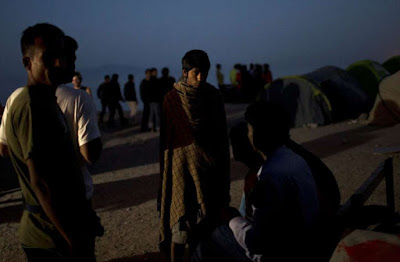After a year of staking out liberal positions and focusing largely on minority voters, Hillary Clinton’s campaign is re-positioning itself to appeal to independent and Republican-leaning white voters turned off by the Republican Party’s presumptive nominee, Donald J. Trump.
With the Democratic nomination in sight, Mrs. Clinton has broadened her economic message, devoted days to apologizing for a comment she previously made that angered working-class whites, and has pledged that her husband, former President Bill Clinton, who remains widely popular among the blue-collar voters drawn to Mr. Trump, would “come out of retirement and be in charge” of creating jobs in places that have been particularly hard hit.
he move comes at a time when the Republican Party is publicly grappling with whether to embrace its unconventional nominee. The House speaker, Paul D. Ryan, on Thursday said he was “just not ready” to back Mr. Trump.
As Mrs. Clinton talks to voters, her campaign is trying to gain endorsements from influential Republican leaders, including former elected officials and retired generals, who can help convince voters that she is their best alternative to Mr. Trump — a striking turn after Mrs. Clinton spent the past year trying to mobilize the liberal wing and labor leaders in the Democratic Party.
But her campaign, confident that the young people and liberals backing Senator Bernie Sanders of Vermont will come around to support Mrs. Clinton in November, is focusing its efforts on white working-class women and suburban women who tend to vote for Republican presidential candidates, but who polls show hold negative views of Mr. Trump.
“I’m here because I want you to know whether people vote for me or not, whether they yell at me or not, it’s not going to affect what I will do to help,” Mrs. Clinton told residents at a health clinic here on Monday, as protesters’ chants outside of “Hillary, go home!” could be heard.
Mrs. Clinton’s two-day swing across Appalachia this week served as the beginning of the campaign’s full-court press to convince persuadable white voters that she would run a more inclusive campaign than Mr. Trump — and to signal that she would cede no demographic group to him.
“I invite a lot of Republicans and independents who I’ve been seeing on the campaign trail, who’ve been reaching out to me, I invite them to join with Democrats,” Mrs. Clinton told CNN on Wednesday. “Let’s get off the red or the blue team. Let’s get on the American team.”
In the Democratic primary, Mrs. Clinton has struggled with non-college-educated white voters and self-identified independents, often losing those groups by wide margins to Mr. Sanders. But faced with the choice between Mrs. Clinton and Mr. Trump, 51 percent of independents and 59 percent of moderates favor the former secretary of state, compared with 41 percent and 39 percent for Mr. Trump, according to the most recent CNN/ORC poll.
“If the primary happened to be over already, we feel the coalition we’ve built has the makings of a winning coalition as it is in a general election,” said Brian Fallon, a Clinton spokesman. “But,” he added, “we’re not satisfied with that. We want to make inroads even with populations that aren’t supporting her in great numbers.”
Senator Sherrod Brown, Democrat of Ohio, who is supporting Mrs. Clinton, said while campaigning with her at a diner in Athens, Ohio, on Tuesday that the suburban women in Cleveland, Columbus and Cincinnati could ultimately decide the November election. “I think educated suburban white women, to be sure, are going to be turned off en masse and there will be more of that,” he said.
But if Mrs. Clinton’s “Breaking Down Barriers Tour” in Kentucky, Ohio and West Virginia this week provided a road map for her campaign’s strategy in the weeks ahead, the antagonistic reception she received also highlighted her own vulnerabilities and tendency to divide and incite people — weaknesses Mr. Trump plans to exploit.
At Mrs. Clinton’s event in Athens, a protester, Peter Schmidt, 34 and a miller, held a handmade sign that read “I’d Rather Be Home Reading Your Goldman Sachs Transcripts,” a reference to the paid speeches she delivered to the Wall Street bank. Mr. Schmidt said her tour of Appalachia felt like pandering. “I don’t trust her,” he said. “That’s why I’m holding this sign.”
Mr. Trump, who has proved adept in connecting with white working-class men, also plans to hit Mrs. Clinton on her previous support for global trade deals that many Americans blame for jobs moving overseas. He has giddily seized on a comment she made to CNN in March that “we’re going to put a lot of coal miners and coal companies out of business.”
The backlash over that remark — made in the context of replacing coal with clean energy jobs — turned Mrs. Clinton’s campaign events into an Appalachian apology tour, as she was repeatedly, and pointedly, forced to explain what she called a “misstatement.”
“I can’t take it back,” Mrs. Clinton told one out-of-work coal industry worker, Bo Copley, 39, a father of three and a registered Republican, when he emotionally confronted her about the comment. “What I want you to know is I’m going to do everything I can to help no matter what happens politically,” she added. “That is just how I am made.”
The Clinton campaign is also moving to exploit the public criticism of Mr. Trump by prominent Republicans.
On Wednesday, the campaign released an online ad that quotes Mr. Trump’s former primary opponents describing him as a “know-nothing candidate,” “a narcissist” and “the most vulgar person ever to aspire to the presidency,” among other epithets.
Priorities USA Action, a “super PAC” supporting Mrs. Clinton, intends to reach out to Republican mega donors disillusioned by their party’s presumptive nominee.
Mrs. Clinton has portrayed Mr. Trump as a “loose canon” on foreign policy and often points to her husband’s record as evidence that she would help blue-collar voters. “The brilliance of Bill Clinton gives her a particular edge,” said Gaston Caperton, a Democratic former governor of West Virginia who supports Mrs. Clinton.
Even with Mr. Clinton in its corner, the Clinton campaign does not expect to win voters like Mr. Copley, who said he is undecided but who generally fits Mr. Trump’s core demographic of supporters. But Mrs. Clinton hopes to make inroads with women like Mr. Copley’s wife, Lauren — voters whom Clinton aides call “megachurch moms” and describe as religious, Republican-leaning women who reject Mr. Trump.
Christine Matthews, a researcher who advises Republicans on how to win female voters, said that portraying Mr. Trump as dangerous on foreign policy could help Mrs. Clinton draw some Republican women whose most important issues are national security and terrorism. “Can she drive moms who have kids who think, ‘Oh my gosh, this is too scary a prospect and our country won’t be safe if he’s elected president?’ ” Ms. Matthews said. “You can imagine that attack ad in your head.”
Democrats acknowledge that the prospect of terrifying skeptical voters into supporting their candidate would not be the most inspirational campaign message.
It is a far bleaker appeal than Ronald Reagan’s message of American exceptionalism and Mr. Clinton’s promise to restore “the forgotten middle class,” both of which inspired white working-class voters to cross party lines.
But Mrs. Clinton’s pitch to Republicans reflects the grim political realities of 2016: More than half of the registered voters who said they would vote for Mrs. Clinton planned to do so in opposition to Mr. Trump, rather than in support of her candidacy, according to the CNN/ORC poll.
“Her bumper sticker for Republicans should be ‘Unified Against Trump’ or ‘Vote for the enemy. It’s important,’ ” said Ben Howe, a Republican and a contributing editor at the conservative online publication Red State, who posted the Clinton campaign’s #I'mWith Her slogan on Twitter after Mr. Trump’s decisive victory in Indiana.
Or, as Jan Franck, 65, a retiree in Charleston, W.Va., put it after hearing Mrs. Clinton speak on Tuesday: “She could be a sock puppet running against Donald Trump, and I’d vote for her.”









































